Reflective Report: Design Thinking for Managers at CQUniversity
VerifiedAdded on 2023/03/29
|11
|2740
|470
Report
AI Summary
This reflective report integrates blogs written throughout a term, providing a critical self-analysis and reflection on learning experiences within a Design Thinking (DT) unit. It focuses on personal and professional development, utilizing Gibb’s reflective model to illustrate the reflective practice. The report describes DT workshop activities, expresses feelings, evaluates, and analyzes the workshop, concluding with learning and lessons for career development. It also includes a future action plan for acquiring skills and knowledge. The student reflects on research, beginner's mindset, brainstorming, problem identification, empathic design, and visualization. Key realizations include the importance of teamwork, active participation, and continuous self-improvement. The report concludes that design thinking is essential for managers, highlighting its role in personal and professional growth.

Running Head: REFLECTIVE REPORT
0
Reflective Report
Design it for managers
(Student details :)
6/4/2019
0
Reflective Report
Design it for managers
(Student details :)
6/4/2019
Paraphrase This Document
Need a fresh take? Get an instant paraphrase of this document with our AI Paraphraser
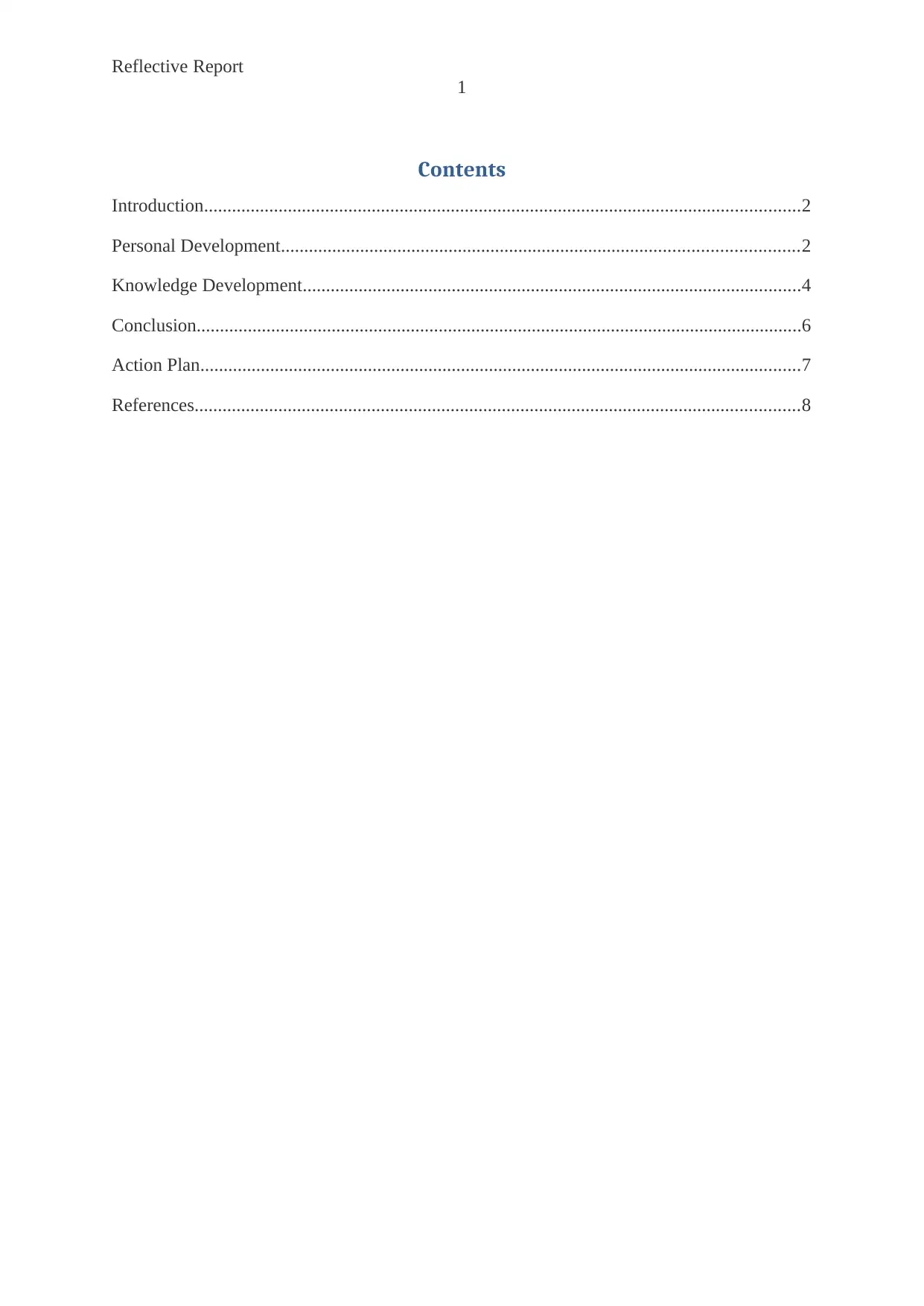
Reflective Report
1
Contents
Introduction................................................................................................................................2
Personal Development...............................................................................................................2
Knowledge Development...........................................................................................................4
Conclusion..................................................................................................................................6
Action Plan.................................................................................................................................7
References..................................................................................................................................8
1
Contents
Introduction................................................................................................................................2
Personal Development...............................................................................................................2
Knowledge Development...........................................................................................................4
Conclusion..................................................................................................................................6
Action Plan.................................................................................................................................7
References..................................................................................................................................8
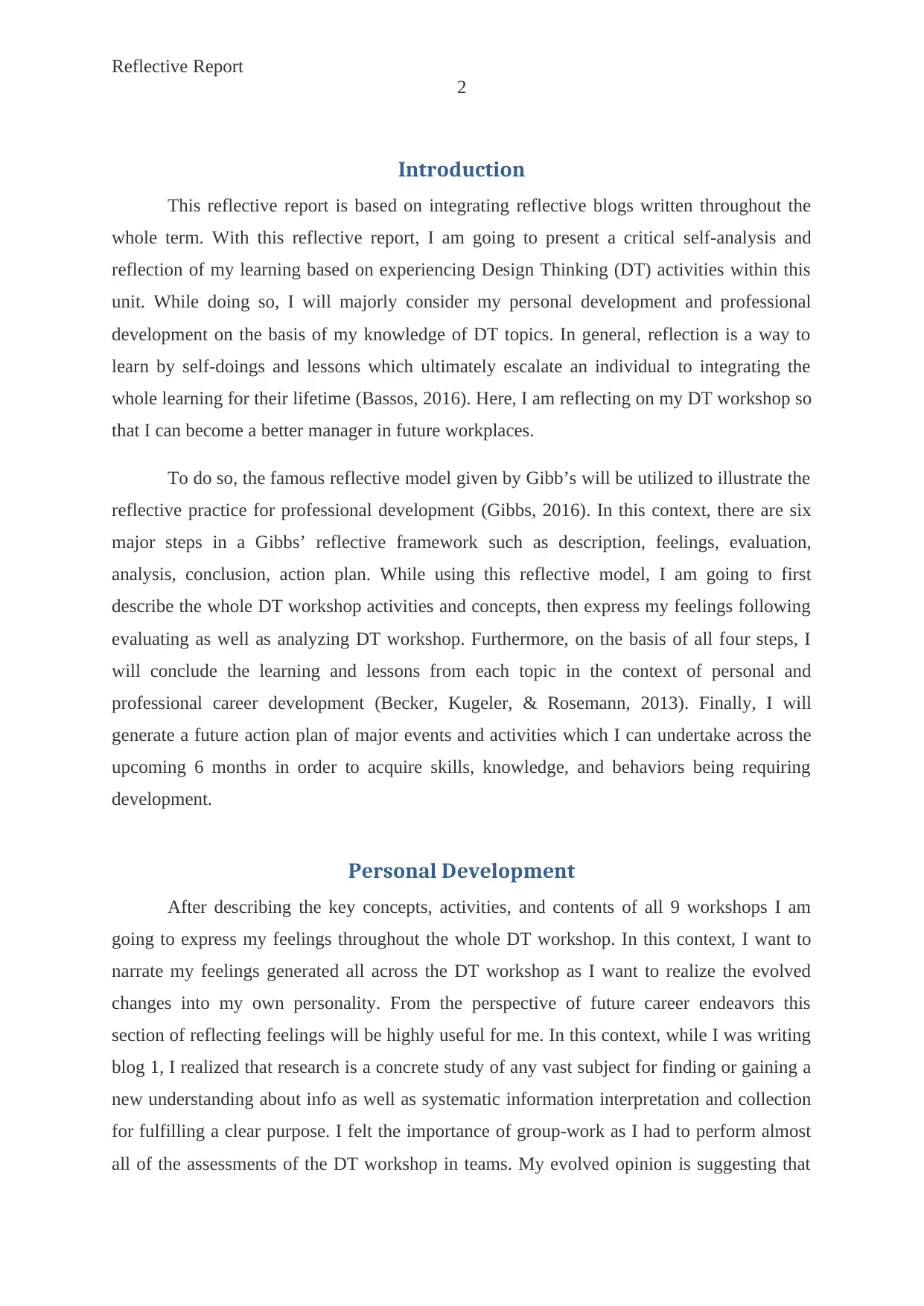
Reflective Report
2
Introduction
This reflective report is based on integrating reflective blogs written throughout the
whole term. With this reflective report, I am going to present a critical self-analysis and
reflection of my learning based on experiencing Design Thinking (DT) activities within this
unit. While doing so, I will majorly consider my personal development and professional
development on the basis of my knowledge of DT topics. In general, reflection is a way to
learn by self-doings and lessons which ultimately escalate an individual to integrating the
whole learning for their lifetime (Bassos, 2016). Here, I am reflecting on my DT workshop so
that I can become a better manager in future workplaces.
To do so, the famous reflective model given by Gibb’s will be utilized to illustrate the
reflective practice for professional development (Gibbs, 2016). In this context, there are six
major steps in a Gibbs’ reflective framework such as description, feelings, evaluation,
analysis, conclusion, action plan. While using this reflective model, I am going to first
describe the whole DT workshop activities and concepts, then express my feelings following
evaluating as well as analyzing DT workshop. Furthermore, on the basis of all four steps, I
will conclude the learning and lessons from each topic in the context of personal and
professional career development (Becker, Kugeler, & Rosemann, 2013). Finally, I will
generate a future action plan of major events and activities which I can undertake across the
upcoming 6 months in order to acquire skills, knowledge, and behaviors being requiring
development.
Personal Development
After describing the key concepts, activities, and contents of all 9 workshops I am
going to express my feelings throughout the whole DT workshop. In this context, I want to
narrate my feelings generated all across the DT workshop as I want to realize the evolved
changes into my own personality. From the perspective of future career endeavors this
section of reflecting feelings will be highly useful for me. In this context, while I was writing
blog 1, I realized that research is a concrete study of any vast subject for finding or gaining a
new understanding about info as well as systematic information interpretation and collection
for fulfilling a clear purpose. I felt the importance of group-work as I had to perform almost
all of the assessments of the DT workshop in teams. My evolved opinion is suggesting that
2
Introduction
This reflective report is based on integrating reflective blogs written throughout the
whole term. With this reflective report, I am going to present a critical self-analysis and
reflection of my learning based on experiencing Design Thinking (DT) activities within this
unit. While doing so, I will majorly consider my personal development and professional
development on the basis of my knowledge of DT topics. In general, reflection is a way to
learn by self-doings and lessons which ultimately escalate an individual to integrating the
whole learning for their lifetime (Bassos, 2016). Here, I am reflecting on my DT workshop so
that I can become a better manager in future workplaces.
To do so, the famous reflective model given by Gibb’s will be utilized to illustrate the
reflective practice for professional development (Gibbs, 2016). In this context, there are six
major steps in a Gibbs’ reflective framework such as description, feelings, evaluation,
analysis, conclusion, action plan. While using this reflective model, I am going to first
describe the whole DT workshop activities and concepts, then express my feelings following
evaluating as well as analyzing DT workshop. Furthermore, on the basis of all four steps, I
will conclude the learning and lessons from each topic in the context of personal and
professional career development (Becker, Kugeler, & Rosemann, 2013). Finally, I will
generate a future action plan of major events and activities which I can undertake across the
upcoming 6 months in order to acquire skills, knowledge, and behaviors being requiring
development.
Personal Development
After describing the key concepts, activities, and contents of all 9 workshops I am
going to express my feelings throughout the whole DT workshop. In this context, I want to
narrate my feelings generated all across the DT workshop as I want to realize the evolved
changes into my own personality. From the perspective of future career endeavors this
section of reflecting feelings will be highly useful for me. In this context, while I was writing
blog 1, I realized that research is a concrete study of any vast subject for finding or gaining a
new understanding about info as well as systematic information interpretation and collection
for fulfilling a clear purpose. I felt the importance of group-work as I had to perform almost
all of the assessments of the DT workshop in teams. My evolved opinion is suggesting that
⊘ This is a preview!⊘
Do you want full access?
Subscribe today to unlock all pages.

Trusted by 1+ million students worldwide
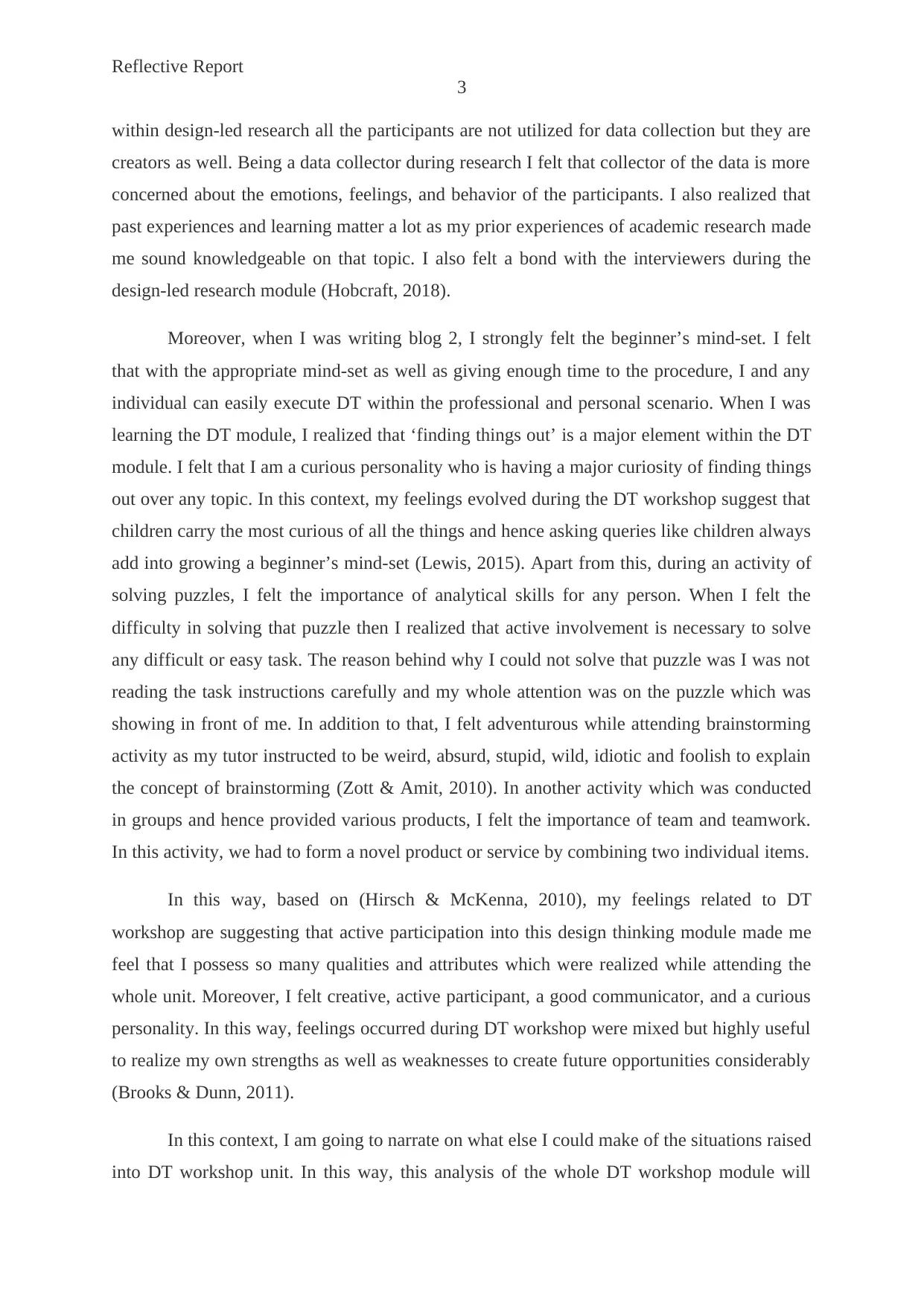
Reflective Report
3
within design-led research all the participants are not utilized for data collection but they are
creators as well. Being a data collector during research I felt that collector of the data is more
concerned about the emotions, feelings, and behavior of the participants. I also realized that
past experiences and learning matter a lot as my prior experiences of academic research made
me sound knowledgeable on that topic. I also felt a bond with the interviewers during the
design-led research module (Hobcraft, 2018).
Moreover, when I was writing blog 2, I strongly felt the beginner’s mind-set. I felt
that with the appropriate mind-set as well as giving enough time to the procedure, I and any
individual can easily execute DT within the professional and personal scenario. When I was
learning the DT module, I realized that ‘finding things out’ is a major element within the DT
module. I felt that I am a curious personality who is having a major curiosity of finding things
out over any topic. In this context, my feelings evolved during the DT workshop suggest that
children carry the most curious of all the things and hence asking queries like children always
add into growing a beginner’s mind-set (Lewis, 2015). Apart from this, during an activity of
solving puzzles, I felt the importance of analytical skills for any person. When I felt the
difficulty in solving that puzzle then I realized that active involvement is necessary to solve
any difficult or easy task. The reason behind why I could not solve that puzzle was I was not
reading the task instructions carefully and my whole attention was on the puzzle which was
showing in front of me. In addition to that, I felt adventurous while attending brainstorming
activity as my tutor instructed to be weird, absurd, stupid, wild, idiotic and foolish to explain
the concept of brainstorming (Zott & Amit, 2010). In another activity which was conducted
in groups and hence provided various products, I felt the importance of team and teamwork.
In this activity, we had to form a novel product or service by combining two individual items.
In this way, based on (Hirsch & McKenna, 2010), my feelings related to DT
workshop are suggesting that active participation into this design thinking module made me
feel that I possess so many qualities and attributes which were realized while attending the
whole unit. Moreover, I felt creative, active participant, a good communicator, and a curious
personality. In this way, feelings occurred during DT workshop were mixed but highly useful
to realize my own strengths as well as weaknesses to create future opportunities considerably
(Brooks & Dunn, 2011).
In this context, I am going to narrate on what else I could make of the situations raised
into DT workshop unit. In this way, this analysis of the whole DT workshop module will
3
within design-led research all the participants are not utilized for data collection but they are
creators as well. Being a data collector during research I felt that collector of the data is more
concerned about the emotions, feelings, and behavior of the participants. I also realized that
past experiences and learning matter a lot as my prior experiences of academic research made
me sound knowledgeable on that topic. I also felt a bond with the interviewers during the
design-led research module (Hobcraft, 2018).
Moreover, when I was writing blog 2, I strongly felt the beginner’s mind-set. I felt
that with the appropriate mind-set as well as giving enough time to the procedure, I and any
individual can easily execute DT within the professional and personal scenario. When I was
learning the DT module, I realized that ‘finding things out’ is a major element within the DT
module. I felt that I am a curious personality who is having a major curiosity of finding things
out over any topic. In this context, my feelings evolved during the DT workshop suggest that
children carry the most curious of all the things and hence asking queries like children always
add into growing a beginner’s mind-set (Lewis, 2015). Apart from this, during an activity of
solving puzzles, I felt the importance of analytical skills for any person. When I felt the
difficulty in solving that puzzle then I realized that active involvement is necessary to solve
any difficult or easy task. The reason behind why I could not solve that puzzle was I was not
reading the task instructions carefully and my whole attention was on the puzzle which was
showing in front of me. In addition to that, I felt adventurous while attending brainstorming
activity as my tutor instructed to be weird, absurd, stupid, wild, idiotic and foolish to explain
the concept of brainstorming (Zott & Amit, 2010). In another activity which was conducted
in groups and hence provided various products, I felt the importance of team and teamwork.
In this activity, we had to form a novel product or service by combining two individual items.
In this way, based on (Hirsch & McKenna, 2010), my feelings related to DT
workshop are suggesting that active participation into this design thinking module made me
feel that I possess so many qualities and attributes which were realized while attending the
whole unit. Moreover, I felt creative, active participant, a good communicator, and a curious
personality. In this way, feelings occurred during DT workshop were mixed but highly useful
to realize my own strengths as well as weaknesses to create future opportunities considerably
(Brooks & Dunn, 2011).
In this context, I am going to narrate on what else I could make of the situations raised
into DT workshop unit. In this way, this analysis of the whole DT workshop module will
Paraphrase This Document
Need a fresh take? Get an instant paraphrase of this document with our AI Paraphraser
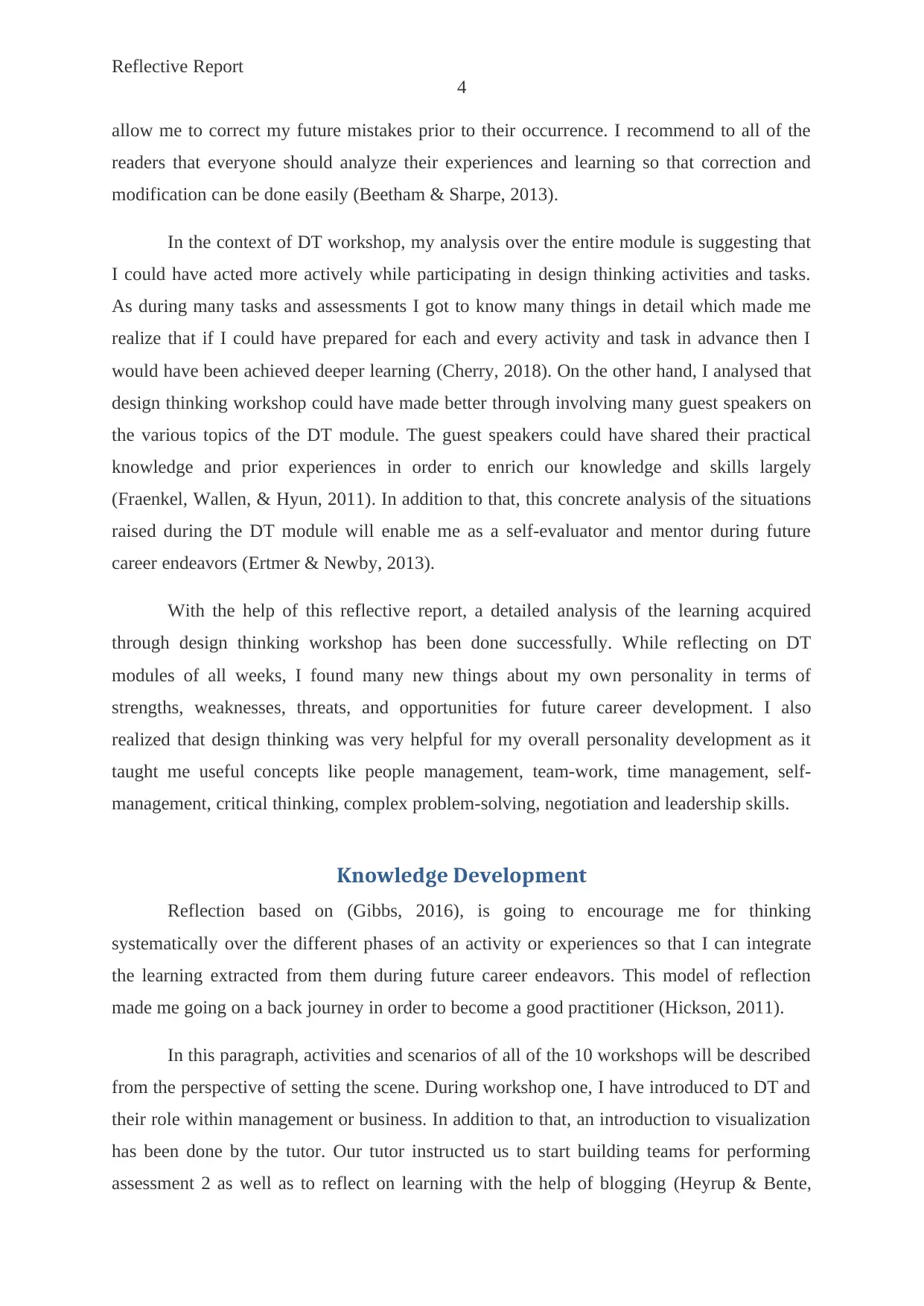
Reflective Report
4
allow me to correct my future mistakes prior to their occurrence. I recommend to all of the
readers that everyone should analyze their experiences and learning so that correction and
modification can be done easily (Beetham & Sharpe, 2013).
In the context of DT workshop, my analysis over the entire module is suggesting that
I could have acted more actively while participating in design thinking activities and tasks.
As during many tasks and assessments I got to know many things in detail which made me
realize that if I could have prepared for each and every activity and task in advance then I
would have been achieved deeper learning (Cherry, 2018). On the other hand, I analysed that
design thinking workshop could have made better through involving many guest speakers on
the various topics of the DT module. The guest speakers could have shared their practical
knowledge and prior experiences in order to enrich our knowledge and skills largely
(Fraenkel, Wallen, & Hyun, 2011). In addition to that, this concrete analysis of the situations
raised during the DT module will enable me as a self-evaluator and mentor during future
career endeavors (Ertmer & Newby, 2013).
With the help of this reflective report, a detailed analysis of the learning acquired
through design thinking workshop has been done successfully. While reflecting on DT
modules of all weeks, I found many new things about my own personality in terms of
strengths, weaknesses, threats, and opportunities for future career development. I also
realized that design thinking was very helpful for my overall personality development as it
taught me useful concepts like people management, team-work, time management, self-
management, critical thinking, complex problem-solving, negotiation and leadership skills.
Knowledge Development
Reflection based on (Gibbs, 2016), is going to encourage me for thinking
systematically over the different phases of an activity or experiences so that I can integrate
the learning extracted from them during future career endeavors. This model of reflection
made me going on a back journey in order to become a good practitioner (Hickson, 2011).
In this paragraph, activities and scenarios of all of the 10 workshops will be described
from the perspective of setting the scene. During workshop one, I have introduced to DT and
their role within management or business. In addition to that, an introduction to visualization
has been done by the tutor. Our tutor instructed us to start building teams for performing
assessment 2 as well as to reflect on learning with the help of blogging (Heyrup & Bente,
4
allow me to correct my future mistakes prior to their occurrence. I recommend to all of the
readers that everyone should analyze their experiences and learning so that correction and
modification can be done easily (Beetham & Sharpe, 2013).
In the context of DT workshop, my analysis over the entire module is suggesting that
I could have acted more actively while participating in design thinking activities and tasks.
As during many tasks and assessments I got to know many things in detail which made me
realize that if I could have prepared for each and every activity and task in advance then I
would have been achieved deeper learning (Cherry, 2018). On the other hand, I analysed that
design thinking workshop could have made better through involving many guest speakers on
the various topics of the DT module. The guest speakers could have shared their practical
knowledge and prior experiences in order to enrich our knowledge and skills largely
(Fraenkel, Wallen, & Hyun, 2011). In addition to that, this concrete analysis of the situations
raised during the DT module will enable me as a self-evaluator and mentor during future
career endeavors (Ertmer & Newby, 2013).
With the help of this reflective report, a detailed analysis of the learning acquired
through design thinking workshop has been done successfully. While reflecting on DT
modules of all weeks, I found many new things about my own personality in terms of
strengths, weaknesses, threats, and opportunities for future career development. I also
realized that design thinking was very helpful for my overall personality development as it
taught me useful concepts like people management, team-work, time management, self-
management, critical thinking, complex problem-solving, negotiation and leadership skills.
Knowledge Development
Reflection based on (Gibbs, 2016), is going to encourage me for thinking
systematically over the different phases of an activity or experiences so that I can integrate
the learning extracted from them during future career endeavors. This model of reflection
made me going on a back journey in order to become a good practitioner (Hickson, 2011).
In this paragraph, activities and scenarios of all of the 10 workshops will be described
from the perspective of setting the scene. During workshop one, I have introduced to DT and
their role within management or business. In addition to that, an introduction to visualization
has been done by the tutor. Our tutor instructed us to start building teams for performing
assessment 2 as well as to reflect on learning with the help of blogging (Heyrup & Bente,
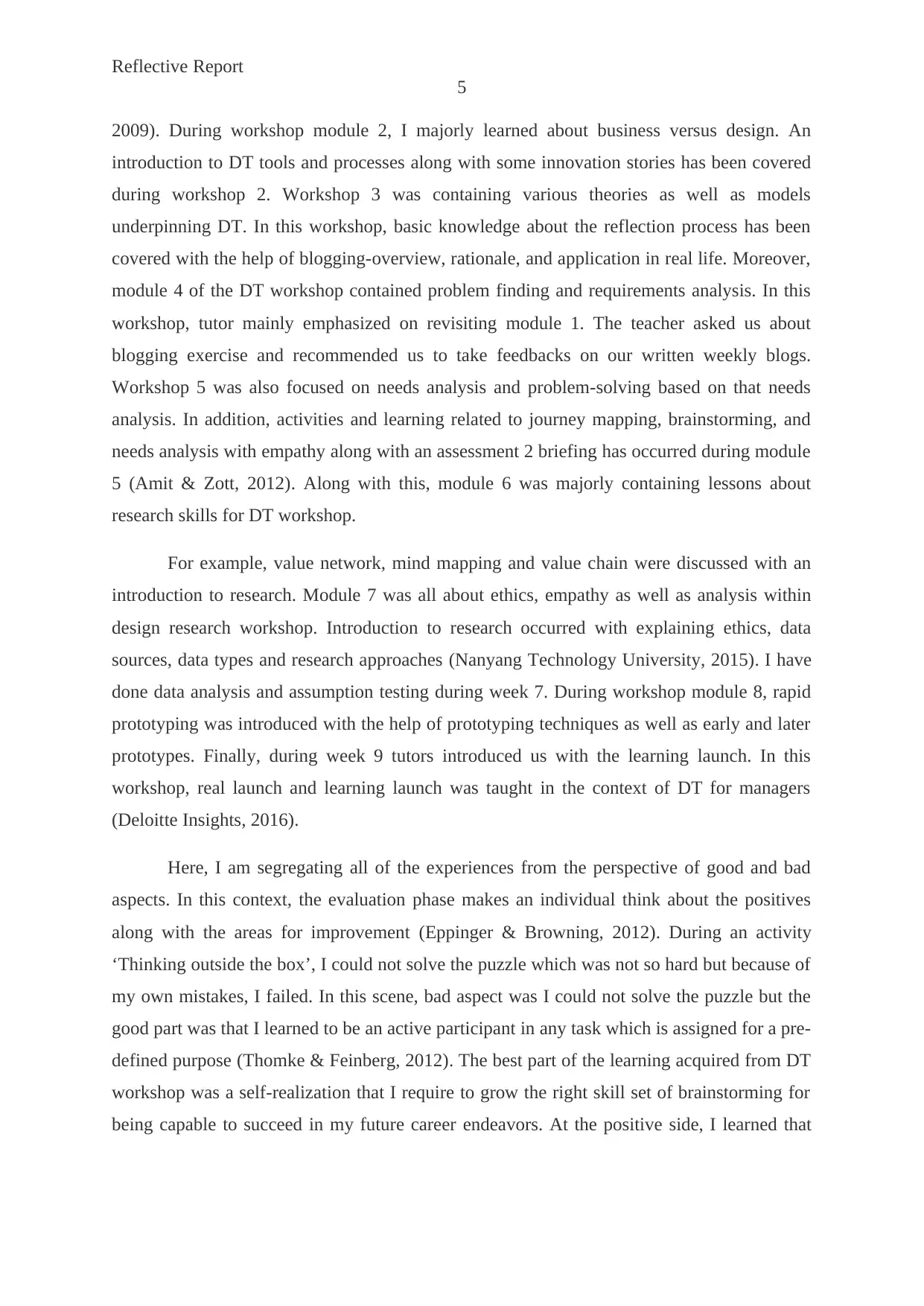
Reflective Report
5
2009). During workshop module 2, I majorly learned about business versus design. An
introduction to DT tools and processes along with some innovation stories has been covered
during workshop 2. Workshop 3 was containing various theories as well as models
underpinning DT. In this workshop, basic knowledge about the reflection process has been
covered with the help of blogging-overview, rationale, and application in real life. Moreover,
module 4 of the DT workshop contained problem finding and requirements analysis. In this
workshop, tutor mainly emphasized on revisiting module 1. The teacher asked us about
blogging exercise and recommended us to take feedbacks on our written weekly blogs.
Workshop 5 was also focused on needs analysis and problem-solving based on that needs
analysis. In addition, activities and learning related to journey mapping, brainstorming, and
needs analysis with empathy along with an assessment 2 briefing has occurred during module
5 (Amit & Zott, 2012). Along with this, module 6 was majorly containing lessons about
research skills for DT workshop.
For example, value network, mind mapping and value chain were discussed with an
introduction to research. Module 7 was all about ethics, empathy as well as analysis within
design research workshop. Introduction to research occurred with explaining ethics, data
sources, data types and research approaches (Nanyang Technology University, 2015). I have
done data analysis and assumption testing during week 7. During workshop module 8, rapid
prototyping was introduced with the help of prototyping techniques as well as early and later
prototypes. Finally, during week 9 tutors introduced us with the learning launch. In this
workshop, real launch and learning launch was taught in the context of DT for managers
(Deloitte Insights, 2016).
Here, I am segregating all of the experiences from the perspective of good and bad
aspects. In this context, the evaluation phase makes an individual think about the positives
along with the areas for improvement (Eppinger & Browning, 2012). During an activity
‘Thinking outside the box’, I could not solve the puzzle which was not so hard but because of
my own mistakes, I failed. In this scene, bad aspect was I could not solve the puzzle but the
good part was that I learned to be an active participant in any task which is assigned for a pre-
defined purpose (Thomke & Feinberg, 2012). The best part of the learning acquired from DT
workshop was a self-realization that I require to grow the right skill set of brainstorming for
being capable to succeed in my future career endeavors. At the positive side, I learned that
5
2009). During workshop module 2, I majorly learned about business versus design. An
introduction to DT tools and processes along with some innovation stories has been covered
during workshop 2. Workshop 3 was containing various theories as well as models
underpinning DT. In this workshop, basic knowledge about the reflection process has been
covered with the help of blogging-overview, rationale, and application in real life. Moreover,
module 4 of the DT workshop contained problem finding and requirements analysis. In this
workshop, tutor mainly emphasized on revisiting module 1. The teacher asked us about
blogging exercise and recommended us to take feedbacks on our written weekly blogs.
Workshop 5 was also focused on needs analysis and problem-solving based on that needs
analysis. In addition, activities and learning related to journey mapping, brainstorming, and
needs analysis with empathy along with an assessment 2 briefing has occurred during module
5 (Amit & Zott, 2012). Along with this, module 6 was majorly containing lessons about
research skills for DT workshop.
For example, value network, mind mapping and value chain were discussed with an
introduction to research. Module 7 was all about ethics, empathy as well as analysis within
design research workshop. Introduction to research occurred with explaining ethics, data
sources, data types and research approaches (Nanyang Technology University, 2015). I have
done data analysis and assumption testing during week 7. During workshop module 8, rapid
prototyping was introduced with the help of prototyping techniques as well as early and later
prototypes. Finally, during week 9 tutors introduced us with the learning launch. In this
workshop, real launch and learning launch was taught in the context of DT for managers
(Deloitte Insights, 2016).
Here, I am segregating all of the experiences from the perspective of good and bad
aspects. In this context, the evaluation phase makes an individual think about the positives
along with the areas for improvement (Eppinger & Browning, 2012). During an activity
‘Thinking outside the box’, I could not solve the puzzle which was not so hard but because of
my own mistakes, I failed. In this scene, bad aspect was I could not solve the puzzle but the
good part was that I learned to be an active participant in any task which is assigned for a pre-
defined purpose (Thomke & Feinberg, 2012). The best part of the learning acquired from DT
workshop was a self-realization that I require to grow the right skill set of brainstorming for
being capable to succeed in my future career endeavors. At the positive side, I learned that
⊘ This is a preview!⊘
Do you want full access?
Subscribe today to unlock all pages.

Trusted by 1+ million students worldwide
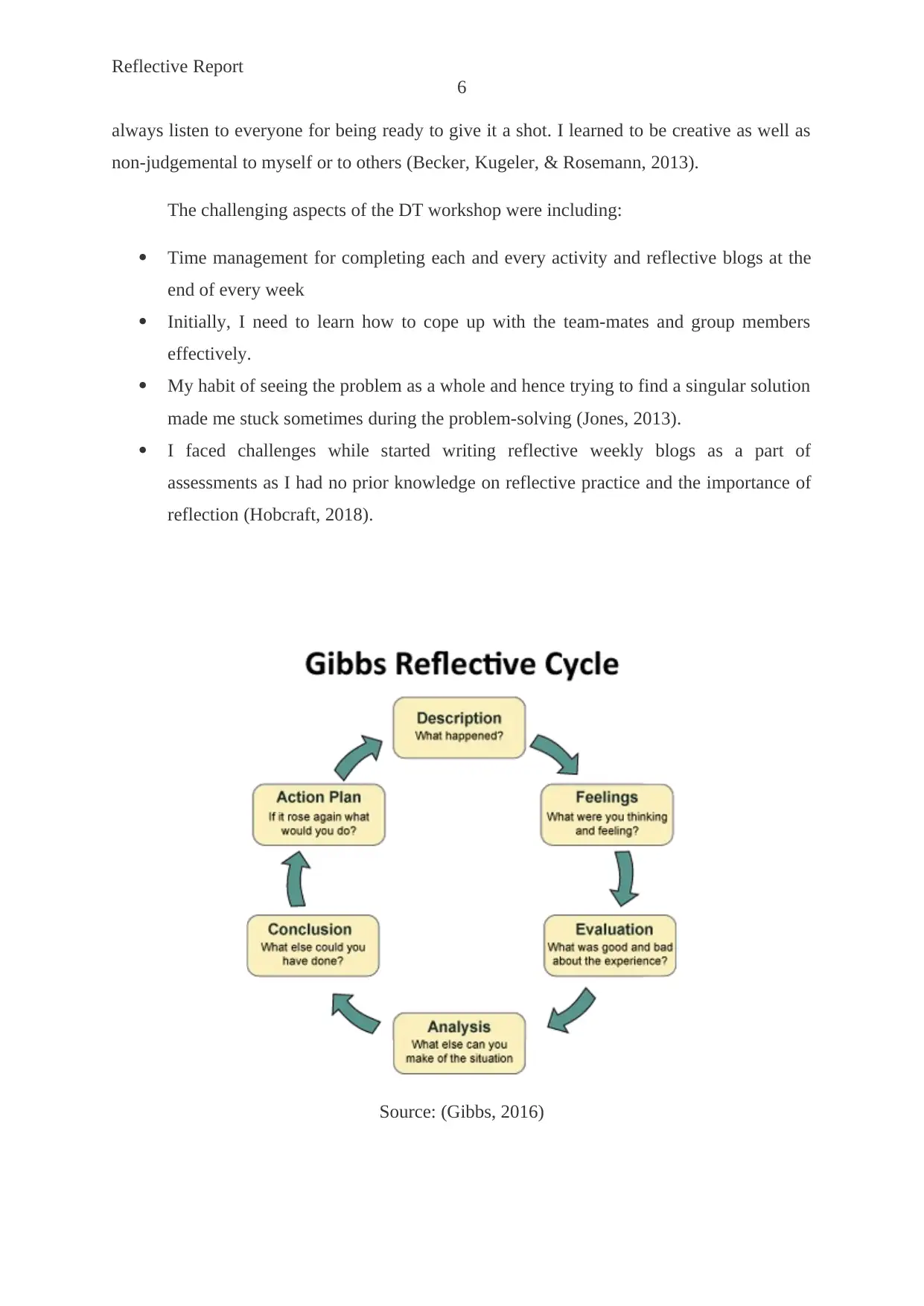
Reflective Report
6
always listen to everyone for being ready to give it a shot. I learned to be creative as well as
non-judgemental to myself or to others (Becker, Kugeler, & Rosemann, 2013).
The challenging aspects of the DT workshop were including:
Time management for completing each and every activity and reflective blogs at the
end of every week
Initially, I need to learn how to cope up with the team-mates and group members
effectively.
My habit of seeing the problem as a whole and hence trying to find a singular solution
made me stuck sometimes during the problem-solving (Jones, 2013).
I faced challenges while started writing reflective weekly blogs as a part of
assessments as I had no prior knowledge on reflective practice and the importance of
reflection (Hobcraft, 2018).
Source: (Gibbs, 2016)
6
always listen to everyone for being ready to give it a shot. I learned to be creative as well as
non-judgemental to myself or to others (Becker, Kugeler, & Rosemann, 2013).
The challenging aspects of the DT workshop were including:
Time management for completing each and every activity and reflective blogs at the
end of every week
Initially, I need to learn how to cope up with the team-mates and group members
effectively.
My habit of seeing the problem as a whole and hence trying to find a singular solution
made me stuck sometimes during the problem-solving (Jones, 2013).
I faced challenges while started writing reflective weekly blogs as a part of
assessments as I had no prior knowledge on reflective practice and the importance of
reflection (Hobcraft, 2018).
Source: (Gibbs, 2016)
Paraphrase This Document
Need a fresh take? Get an instant paraphrase of this document with our AI Paraphraser
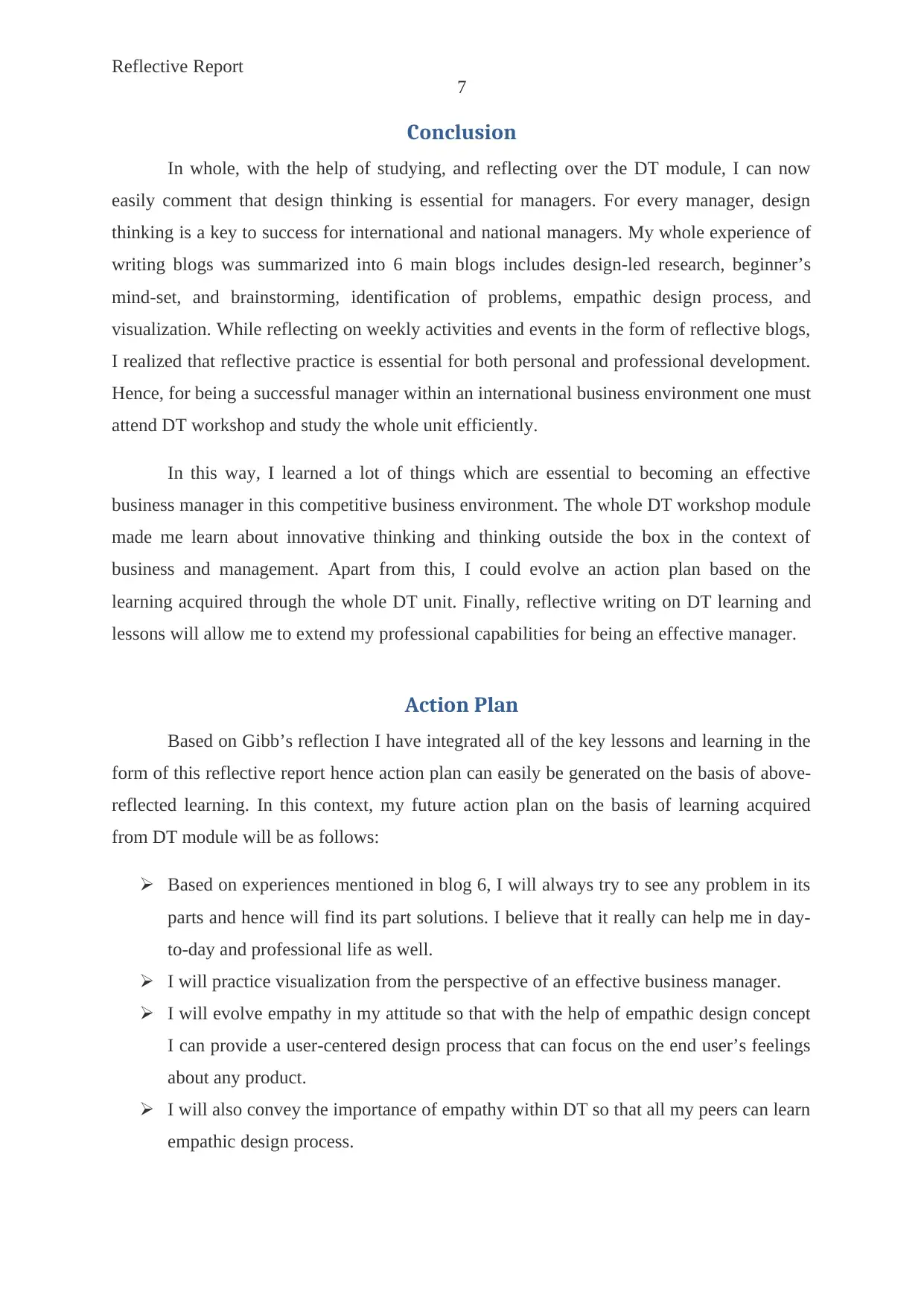
Reflective Report
7
Conclusion
In whole, with the help of studying, and reflecting over the DT module, I can now
easily comment that design thinking is essential for managers. For every manager, design
thinking is a key to success for international and national managers. My whole experience of
writing blogs was summarized into 6 main blogs includes design-led research, beginner’s
mind-set, and brainstorming, identification of problems, empathic design process, and
visualization. While reflecting on weekly activities and events in the form of reflective blogs,
I realized that reflective practice is essential for both personal and professional development.
Hence, for being a successful manager within an international business environment one must
attend DT workshop and study the whole unit efficiently.
In this way, I learned a lot of things which are essential to becoming an effective
business manager in this competitive business environment. The whole DT workshop module
made me learn about innovative thinking and thinking outside the box in the context of
business and management. Apart from this, I could evolve an action plan based on the
learning acquired through the whole DT unit. Finally, reflective writing on DT learning and
lessons will allow me to extend my professional capabilities for being an effective manager.
Action Plan
Based on Gibb’s reflection I have integrated all of the key lessons and learning in the
form of this reflective report hence action plan can easily be generated on the basis of above-
reflected learning. In this context, my future action plan on the basis of learning acquired
from DT module will be as follows:
Based on experiences mentioned in blog 6, I will always try to see any problem in its
parts and hence will find its part solutions. I believe that it really can help me in day-
to-day and professional life as well.
I will practice visualization from the perspective of an effective business manager.
I will evolve empathy in my attitude so that with the help of empathic design concept
I can provide a user-centered design process that can focus on the end user’s feelings
about any product.
I will also convey the importance of empathy within DT so that all my peers can learn
empathic design process.
7
Conclusion
In whole, with the help of studying, and reflecting over the DT module, I can now
easily comment that design thinking is essential for managers. For every manager, design
thinking is a key to success for international and national managers. My whole experience of
writing blogs was summarized into 6 main blogs includes design-led research, beginner’s
mind-set, and brainstorming, identification of problems, empathic design process, and
visualization. While reflecting on weekly activities and events in the form of reflective blogs,
I realized that reflective practice is essential for both personal and professional development.
Hence, for being a successful manager within an international business environment one must
attend DT workshop and study the whole unit efficiently.
In this way, I learned a lot of things which are essential to becoming an effective
business manager in this competitive business environment. The whole DT workshop module
made me learn about innovative thinking and thinking outside the box in the context of
business and management. Apart from this, I could evolve an action plan based on the
learning acquired through the whole DT unit. Finally, reflective writing on DT learning and
lessons will allow me to extend my professional capabilities for being an effective manager.
Action Plan
Based on Gibb’s reflection I have integrated all of the key lessons and learning in the
form of this reflective report hence action plan can easily be generated on the basis of above-
reflected learning. In this context, my future action plan on the basis of learning acquired
from DT module will be as follows:
Based on experiences mentioned in blog 6, I will always try to see any problem in its
parts and hence will find its part solutions. I believe that it really can help me in day-
to-day and professional life as well.
I will practice visualization from the perspective of an effective business manager.
I will evolve empathy in my attitude so that with the help of empathic design concept
I can provide a user-centered design process that can focus on the end user’s feelings
about any product.
I will also convey the importance of empathy within DT so that all my peers can learn
empathic design process.
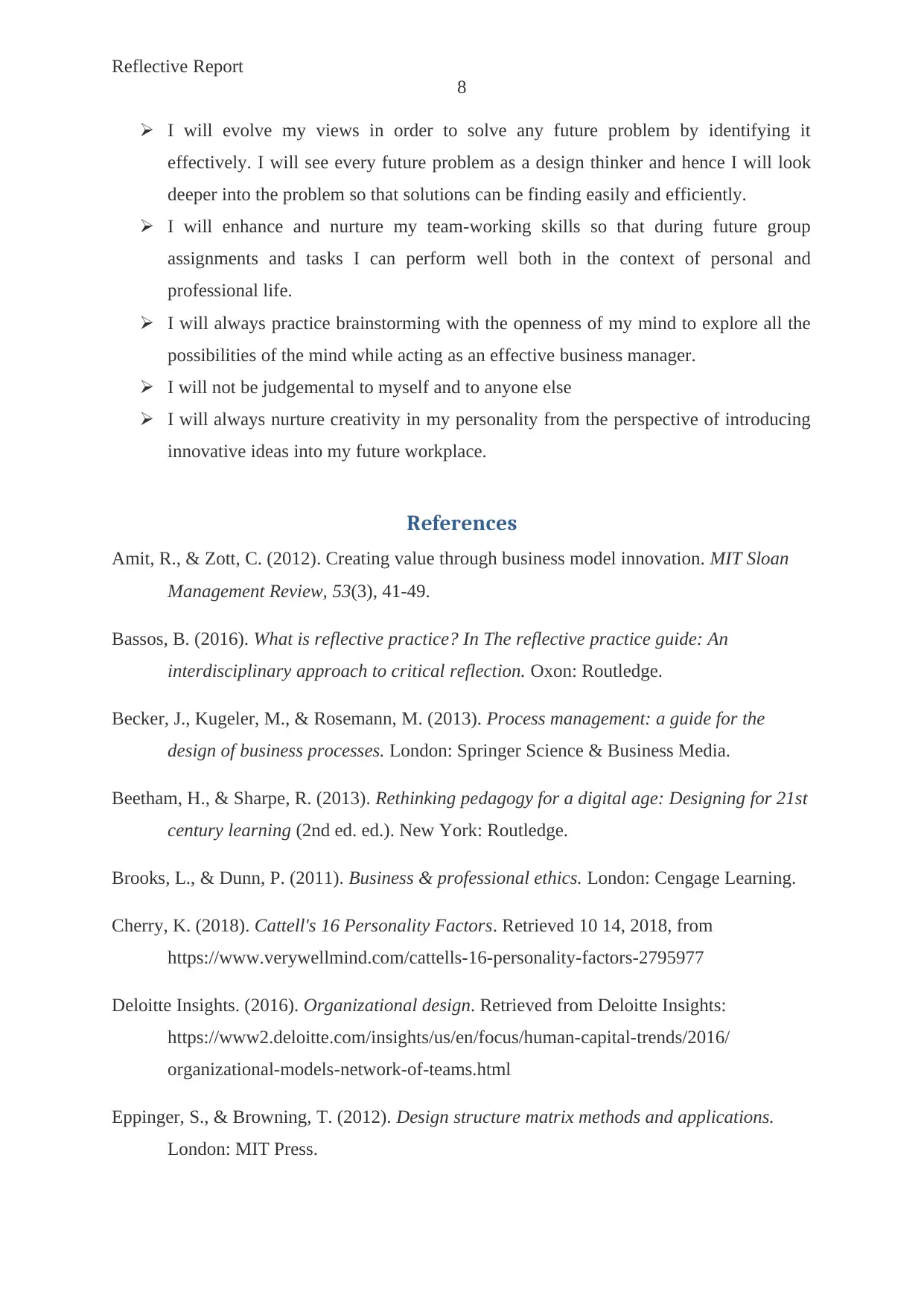
Reflective Report
8
I will evolve my views in order to solve any future problem by identifying it
effectively. I will see every future problem as a design thinker and hence I will look
deeper into the problem so that solutions can be finding easily and efficiently.
I will enhance and nurture my team-working skills so that during future group
assignments and tasks I can perform well both in the context of personal and
professional life.
I will always practice brainstorming with the openness of my mind to explore all the
possibilities of the mind while acting as an effective business manager.
I will not be judgemental to myself and to anyone else
I will always nurture creativity in my personality from the perspective of introducing
innovative ideas into my future workplace.
References
Amit, R., & Zott, C. (2012). Creating value through business model innovation. MIT Sloan
Management Review, 53(3), 41-49.
Bassos, B. (2016). What is reflective practice? In The reflective practice guide: An
interdisciplinary approach to critical reflection. Oxon: Routledge.
Becker, J., Kugeler, M., & Rosemann, M. (2013). Process management: a guide for the
design of business processes. London: Springer Science & Business Media.
Beetham, H., & Sharpe, R. (2013). Rethinking pedagogy for a digital age: Designing for 21st
century learning (2nd ed. ed.). New York: Routledge.
Brooks, L., & Dunn, P. (2011). Business & professional ethics. London: Cengage Learning.
Cherry, K. (2018). Cattell's 16 Personality Factors. Retrieved 10 14, 2018, from
https://www.verywellmind.com/cattells-16-personality-factors-2795977
Deloitte Insights. (2016). Organizational design. Retrieved from Deloitte Insights:
https://www2.deloitte.com/insights/us/en/focus/human-capital-trends/2016/
organizational-models-network-of-teams.html
Eppinger, S., & Browning, T. (2012). Design structure matrix methods and applications.
London: MIT Press.
8
I will evolve my views in order to solve any future problem by identifying it
effectively. I will see every future problem as a design thinker and hence I will look
deeper into the problem so that solutions can be finding easily and efficiently.
I will enhance and nurture my team-working skills so that during future group
assignments and tasks I can perform well both in the context of personal and
professional life.
I will always practice brainstorming with the openness of my mind to explore all the
possibilities of the mind while acting as an effective business manager.
I will not be judgemental to myself and to anyone else
I will always nurture creativity in my personality from the perspective of introducing
innovative ideas into my future workplace.
References
Amit, R., & Zott, C. (2012). Creating value through business model innovation. MIT Sloan
Management Review, 53(3), 41-49.
Bassos, B. (2016). What is reflective practice? In The reflective practice guide: An
interdisciplinary approach to critical reflection. Oxon: Routledge.
Becker, J., Kugeler, M., & Rosemann, M. (2013). Process management: a guide for the
design of business processes. London: Springer Science & Business Media.
Beetham, H., & Sharpe, R. (2013). Rethinking pedagogy for a digital age: Designing for 21st
century learning (2nd ed. ed.). New York: Routledge.
Brooks, L., & Dunn, P. (2011). Business & professional ethics. London: Cengage Learning.
Cherry, K. (2018). Cattell's 16 Personality Factors. Retrieved 10 14, 2018, from
https://www.verywellmind.com/cattells-16-personality-factors-2795977
Deloitte Insights. (2016). Organizational design. Retrieved from Deloitte Insights:
https://www2.deloitte.com/insights/us/en/focus/human-capital-trends/2016/
organizational-models-network-of-teams.html
Eppinger, S., & Browning, T. (2012). Design structure matrix methods and applications.
London: MIT Press.
⊘ This is a preview!⊘
Do you want full access?
Subscribe today to unlock all pages.

Trusted by 1+ million students worldwide
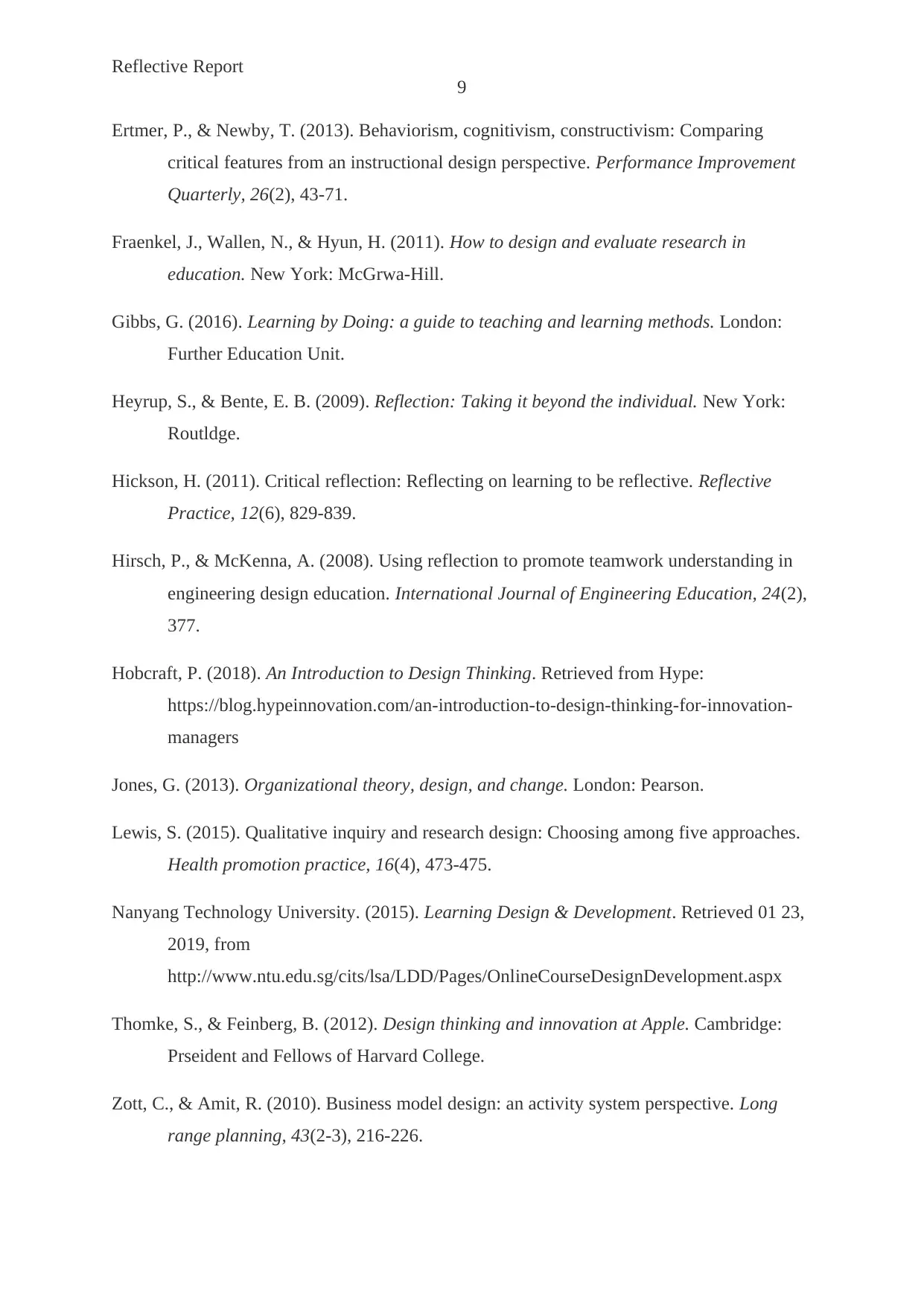
Reflective Report
9
Ertmer, P., & Newby, T. (2013). Behaviorism, cognitivism, constructivism: Comparing
critical features from an instructional design perspective. Performance Improvement
Quarterly, 26(2), 43-71.
Fraenkel, J., Wallen, N., & Hyun, H. (2011). How to design and evaluate research in
education. New York: McGrwa-Hill.
Gibbs, G. (2016). Learning by Doing: a guide to teaching and learning methods. London:
Further Education Unit.
Heyrup, S., & Bente, E. B. (2009). Reflection: Taking it beyond the individual. New York:
Routldge.
Hickson, H. (2011). Critical reflection: Reflecting on learning to be reflective. Reflective
Practice, 12(6), 829-839.
Hirsch, P., & McKenna, A. (2008). Using reflection to promote teamwork understanding in
engineering design education. International Journal of Engineering Education, 24(2),
377.
Hobcraft, P. (2018). An Introduction to Design Thinking. Retrieved from Hype:
https://blog.hypeinnovation.com/an-introduction-to-design-thinking-for-innovation-
managers
Jones, G. (2013). Organizational theory, design, and change. London: Pearson.
Lewis, S. (2015). Qualitative inquiry and research design: Choosing among five approaches.
Health promotion practice, 16(4), 473-475.
Nanyang Technology University. (2015). Learning Design & Development. Retrieved 01 23,
2019, from
http://www.ntu.edu.sg/cits/lsa/LDD/Pages/OnlineCourseDesignDevelopment.aspx
Thomke, S., & Feinberg, B. (2012). Design thinking and innovation at Apple. Cambridge:
Prseident and Fellows of Harvard College.
Zott, C., & Amit, R. (2010). Business model design: an activity system perspective. Long
range planning, 43(2-3), 216-226.
9
Ertmer, P., & Newby, T. (2013). Behaviorism, cognitivism, constructivism: Comparing
critical features from an instructional design perspective. Performance Improvement
Quarterly, 26(2), 43-71.
Fraenkel, J., Wallen, N., & Hyun, H. (2011). How to design and evaluate research in
education. New York: McGrwa-Hill.
Gibbs, G. (2016). Learning by Doing: a guide to teaching and learning methods. London:
Further Education Unit.
Heyrup, S., & Bente, E. B. (2009). Reflection: Taking it beyond the individual. New York:
Routldge.
Hickson, H. (2011). Critical reflection: Reflecting on learning to be reflective. Reflective
Practice, 12(6), 829-839.
Hirsch, P., & McKenna, A. (2008). Using reflection to promote teamwork understanding in
engineering design education. International Journal of Engineering Education, 24(2),
377.
Hobcraft, P. (2018). An Introduction to Design Thinking. Retrieved from Hype:
https://blog.hypeinnovation.com/an-introduction-to-design-thinking-for-innovation-
managers
Jones, G. (2013). Organizational theory, design, and change. London: Pearson.
Lewis, S. (2015). Qualitative inquiry and research design: Choosing among five approaches.
Health promotion practice, 16(4), 473-475.
Nanyang Technology University. (2015). Learning Design & Development. Retrieved 01 23,
2019, from
http://www.ntu.edu.sg/cits/lsa/LDD/Pages/OnlineCourseDesignDevelopment.aspx
Thomke, S., & Feinberg, B. (2012). Design thinking and innovation at Apple. Cambridge:
Prseident and Fellows of Harvard College.
Zott, C., & Amit, R. (2010). Business model design: an activity system perspective. Long
range planning, 43(2-3), 216-226.
Paraphrase This Document
Need a fresh take? Get an instant paraphrase of this document with our AI Paraphraser

Reflective Report
10
10
1 out of 11
Related Documents
Your All-in-One AI-Powered Toolkit for Academic Success.
+13062052269
info@desklib.com
Available 24*7 on WhatsApp / Email
![[object Object]](/_next/static/media/star-bottom.7253800d.svg)
Unlock your academic potential
Copyright © 2020–2026 A2Z Services. All Rights Reserved. Developed and managed by ZUCOL.



